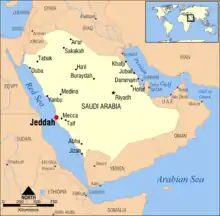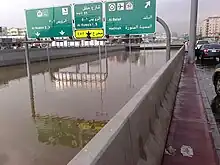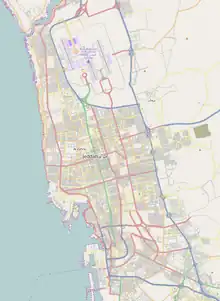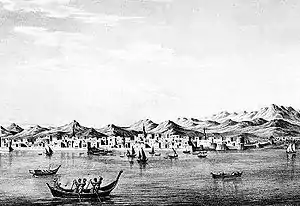 | |
| Meteorological history | |
|---|---|
| Duration | 25 November 2009 |
| Overall effects | |
| Fatalities | 122[1] (more than 350 missing) |
| Damage | SRls 1 billion |
| Areas affected | Jeddah and other areas of Makkah Province |



The 2009 Saudi Arabian floods affected Jeddah, on the Red Sea (western) coast of Saudi Arabia, and other areas of Makkah Province.[2][3] They have been described by civil defence officials as the worst in 27 years.[4] As of 3 January 2010, some 122 people had been reported to have been killed,[1] and more than 350 were missing.[2] Some roads were under a meter (three feet) of water on 26 November, and many of the victims were believed to have drowned in their cars. At least 3,000 vehicles were swept away or damaged.[2][5][6] The death toll was expected to rise as flood waters receded, allowing rescuers to reach stranded vehicles.[7]
More than 70 millimetres (2.76 inches) of rain fell in Jeddah in just four hours on 25 November.[2][5] This is nearly twice the average for an entire year[8] and the heaviest rainfall in Saudi Arabia in a decade.[9] The flooding came just two days before the expected date of the Eid al-Adha festival[4] and during the annual Hajj pilgrimage to nearby Mecca.[10] Business losses were estimated at a billion riyals (US$270 million). The poorer neighbourhoods in the south of Jeddah were particularly hard hit,[11][12] as was the area around King Abdulaziz University. The university was closed for vacation at the time of the floods, preventing even higher casualties.[13]
Geography and hydrology of Jeddah
The city of Jeddah is situated on the Red Sea coast, beneath the northern escarpment of the Red Sea Rift known as the Jabal al Hejaz, which reaches 600 to 1,000 metres (2,000 to 3,300 ft) in the region. The population of the city is about 3.4 million (2009 estimate) in an urban area of 1,765 km2 (681 sq mi), giving a population density of 1,900 inhabitants per square kilometre (4,900/sq mi). The climate is arid, with most rainfall occurring between November and January, usually as thunderstorms.[14]
| Jan | Feb | Mar | Apr | May | Jun | Jul | Aug | Sep | Oct | Nov | Dec |
|---|---|---|---|---|---|---|---|---|---|---|---|
| 11.2 (0.4) |
4.5 (0.2) |
4.2 (0.2) |
1.0 (0.0) |
0.9 (0.0) |
0.0 (0.0) |
0.1 (0.0) |
0.0 (0.0) |
0.1 (0.0) |
0.6 (0.0) |
18.2 (0.7) |
16.2 (0.6) |
| Total: 56.1 mm (2.2 in.). Source: Global Historical Climatology Network, version 1 | |||||||||||
At least eleven wadis converge on the city,[11] and localised flooding is common after rain. The municipality is currently investing 1 billion riyals (US$270 million) in storm drains, but the cost of a full system is estimated at an additional 3 billion riyals (US$800 million).[15] In November 2009, only some 30% of the city was protected against flash flooding and then, often with only one-inch (25-millimetre) pipes.[15]
2009 Hajj pilgrimage
25 November was the first day of the annual four-day Hajj pilgrimage to Islamic holy sites in and around Mecca, for which Jeddah is the main entry point for foreign pilgrims arriving by air or sea. The number of foreigners, as well as Saudi citizens,[16] was slightly lower than in previous years, possibly because of health fears due to the pandemic of H1N1 influenza. However, over 1.6 million are still believed to have made the hajj, with 200,000 coming from Indonesia alone.[9]
According to the Saudi Interior Ministry, none of the flood victims were taking part in the pilgrimage.[2][3] However, the main Haramain expressway between King Abdulaziz International Airport and Mecca was closed on 25 November, stranding thousands of pilgrims. Parts of the 80-kilometre (50 mi) highway were reported to have caved in, and the Jamia bridge in eastern Jeddah partially collapsed.[4] The highway remained closed on 26 November amid fears that the bridge would collapse completely.[6]
Rain was unusually heavy in Mecca on 25 November,[10] as well as in nearby Mina, where many pilgrims stay in vast tent cities. The weather had improved by 26 November, and pilgrims had to face "scorching heat" on the plain of Mount Arafat for the second day of the Hajj.[9][17] Hassan Al-Bushra, an epidemiologist at the Cairo office of the World Health Organization, said "there is no evidence" that the rain would worsen the spread of the H1N1 flu virus, a view shared by the U.S. Centers for Disease Control and Prevention (CDC).[17]
References
- 1 2 Arab News
- 1 2 3 4 5 Saudi Arabian floods kill 77, leave scores missing, Agence France Presse, 26 November 2009, retrieved 26 November 2009
- 1 2 "Saudi Arabia floods leave 48 dead". BBC News. 26 November 2009. Retrieved 26 November 2009.
- 1 2 3 Ayman Anqawi (26 November 2009). "Flooding kills 77 in Jeddah, Thousands of pilgrims stranded on highway". Saudi Gazette. Archived from the original on 30 November 2009. Retrieved 26 November 2009.
- 1 2 Saleh Al Zahrani (26 November 2009), "Damage may top SR1 billion", Saudi Gazette, archived from the original on 20 May 2010, retrieved 27 November 2009
- 1 2 Ibrahim Alawi; Eid Al-Harthi (27 November 2009), "King orders aid for victims, Death toll in Jeddah flooding hits 83", Saudi Gazette, archived from the original on 2 March 2012, retrieved 26 November 2009
- ↑ Muhammad Humaidan (27 November 2009), "Jeddah flood death toll reaches 77", Arab News, retrieved 27 November 2009
- ↑ Jidda, Saudi Arabia: Average rainfall, World Climate, retrieved 27 November 2009
- 1 2 3 Ian Black (26 November 2009), "Muslim pilgrims climb Mount Arafat as 2m brave heat outside Mecca", The Guardian
- 1 2 "Rain soaks hajj pilgrims in Mecca", The Daily Telegraph, 25 November 2009
- 1 2 Al Bargi, Abdullah (26 November 2009), "Jeddah, city in a lake", Saudi Gazette, archived from the original on 2 December 2009, retrieved 27 November 2009
- ↑ Faleh Al Dhibyani (27 November 2009), "Anxious residents follow weather reports amid clean-up", Saudi Gazette, archived from the original on 2 March 2012, retrieved 27 November 2009
- ↑ Michel Cousins (27 November 2009), "What happened was a man-made problem", Arab News, retrieved 27 November 2009
- ↑ Geographical Location and Climate, Jeddah Municipality, archived from the original on 15 September 2009, retrieved 27 November 2009
- 1 2 Abdulaziz Ghazzawi (27 November 2009), "SR3 billion needed for proper drainage: Official", Saudi Gazette, archived from the original on 2 March 2012, retrieved 27 November 2009
- ↑ "Heavy rain and swine flu fears hamper Hajj". BBC News. 25 November 2009. Retrieved 27 November 2009.
- 1 2 "Bright weather greets pilgrims on Arafat", Saudi Gazette, 27 November 2009, archived from the original on 2 March 2012, retrieved 27 November 2009
External links
See also
- 2022 Saudi Arabia floods, also hit Jeddah
21°30′N 39°11′E / 21.500°N 39.183°E